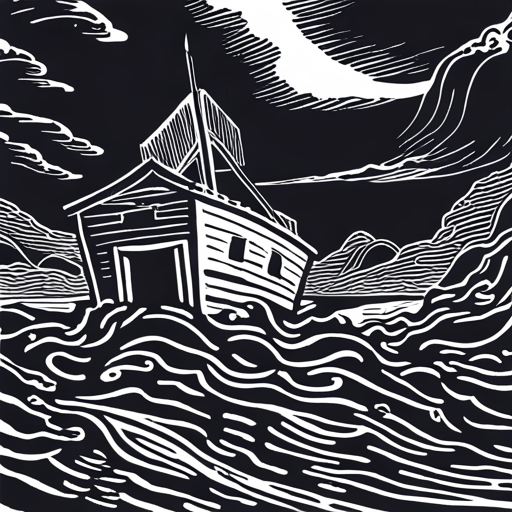TLDR: A guide for having a family discipleship time on Genesis 7–8 based on the ACT Bible Study Method.
Act 2: People Disobey
Scene 5: Noah During the Flood
Genesis 7:1—8:19
Analyze the Passage
Step 1: Introduce the Passage
Genesis was written by Moses sometime between 1445–1405 BC to help the Israelites leaving Egypt understand their history with God. It’s one of the five books of the Law that Moses wrote, which we also call the Torah, or the Pentateuch, which means “five books.”
Today’s true story picks up from our last story. Last time, we saw how people had become so evil that God decided to wipe them off the earth by a flood. But he chose to spare Noah and his family from this flood of judgment. He gave Noah very specific instructions to build a very large boat. That’s where we pick up the story. This is the fifth story of Act 2: People Disobey.
Step 2: Read the Passage
Step 3: Summarize the Passage
God told Noah to get ready to get on the boat and that he would need to bring seven pairs of every clean animal and a pair of every unclean animal with him. It would rain in seven days and that rain would last 40 days and 40 nights (7:1–4).
Noah obeyed God. They got on the boat and God shut them in. Noah was 600 years old when the rains began. The rains lasted just as God had said; waters burst forth from above and below. All the people and animals outside of the boat died (vv. 5–23).
The flood lasted 150 days (v. 24).
God then caused a wind to drive the flood waters down. The boat then came to rest on a mountain. After 40 days, Noah sent a dove out to see if the ground was dry, but it wasn’t. A week later, he sent the dove again, and this time it returned with an olive leaf, meaning the ground was dry. A week later, he sent out the dove again and it didn’t return (8:1–12).
Noah then removed the cover from the boat and saw the ground was indeed dry. God told Noah and his family to come out of the ark and bring the animals with them. They were to be fruitful and multiply across the earth (vv. 13–19).
Step 4: Interrogate the Passage
Questions you and your family ask might include:
- Why does the Bible repeat the details of this story so often?
- Why did Noah bring seven pairs of clean animals and a pair of unclean animals?
- What are clean and unclean animals?
- What were the fountains of the great deep that burst open?
- Was this flood across the entire world?
Step 5: Wonder about the Passage
Wonder statements you and your family make might include:
- I wonder what it was like seeing God bring all the animals to the boat.
- I wonder what it smelled like and sounded like on the boat.
- I wonder if the animals got along on the boat.
- I wonder what it was like to be on dry ground again.
- I wonder if it was hard for Noah and his family to see any of the animals leave.
Connect the Passage to Christ
Step 6: Find the World in Front of Text
This story reminds us of how seriously God takes sin. We often think of a little boat with cute animals when we think of Noah’s ark, but we can’t miss that many, many people (and animals) died in this story. God had warned Adam and Eve that sin would lead to death. And here, we see that God is true to his word. This is another glimpse of an upside-down world, one that is nothing like it’s supposed to be. Instead, the world is supposed to be one where all people obey him. God didn’t intend for floods of judgment to cover his creation, but rather floods of blessings.
Step 7: Find the World of Jesus of the Text
God sent a flood upon the earth because people had become full of pride and weren’t just disobeying him, but they were also looking for ways to do disobey God even more. Noah, on the other hand, is a person full of humility who did exactly as God told him to do. It took great humility for Noah to believe God about the coming flood and build an ark on land that was dry at the time. We can only imagine the puzzled looks, questions, and mockery he endured while building it. But no matter, Noah obeyed God down to the smallest detail.
Noah is a good example of humility and obedience, but Jesus was an even better example—the perfect example. Jesus came to earth in the greatest of humility. He, too, endured scorn and mockery. And all the while, he obeyed the Father fully—in all matters big and small.
Translate It to Your Context
Step 8: Connect the World of Jesus of the Text to Your World
How can you be especially humble this week? Remember, humility is not thinking poorly of yourself; it is thinking more highly of God and others. It is putting God first, others second, and yourself third. What are ways that you can display humility with your friends, family, and others to show them Jesus?
How can you obey God this week, in big ways and small ways, so that people might see Jesus in you? Think about all the places you will be this week and what you will do. How can you obey God and people he has placed in authority with joy?
NEXT: Act 2: People Disobey; Scene 6: Noah After the Flood (Genesis 8:20—9:17)
Learn more about this family discipleship method here.


Leave a comment